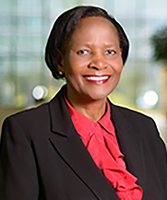Alumni of the Month

Winnie Mpanju SHUMBUSHO
YEAR OF MATRICULATION: 1974
EDUCATION:
Dr. Winnie Mpanju-Shumbusho [née Mpanju], a Tanzanian national and currently Chairperson of WHO’s Board of ‘Roll-Back-Malaria [RBM] Partnership to End Malaria’, is the University of Dar es Salaam’s ‘Alumna of the Month’ this November 2020. At the head of an international team of high-level health-care researchers, healthcare givers and promoters, and with a wealth of experience in medical study and practice, Dr. Mpanju-Shumbusho has a nice story to hear regarding her career and her current international professional commitment.
Born in the village of Maruku in Bukoba district, Kagera Region, Winifrida Kokwenda Mpanju had her primary education within the same village before she moved on to secondary education and passing her ‘Advanced-level’ examinations which enabled her to enrol for university studies in medicine. She was admitted at the-then Faculty of Medicine of the University of Dar es Salaam, predecessor to today’s Muhimbili University of Health and Allied Sciences (MUHAS). She graduated in 1979 with a Doctor of Medicine degree. Given her exemplary performance and success, she was identified and posted to Ocean Road Hospital (today’s Ocean Road Cancer Institute), where for two years (from 1980 to 1981) she was assigned as the medical officer-incharge and was steeped into research investigations into certain identified diseases. Ocean Road—as the hospital was frequently referred to—was on the nation’s historical record as a centre having been first established in 1897 for research in tropical diseases, attracting medical research scientists such as the Nobel prize-winning German bacteriologist-pathologist Robert Koch (1843-1910).
Winnie’s performance and leadership qualities at Ocean Road Hospital thus recognised, she was awarded, in 1981, a two-year Hubert H. Humphrey North-South Fellowship for graduate study at Tulane University in New Orleans, Louisiana, USA, where she graduated with a Master of Public Health degree from the University’s School of Public Health and Tropical Medicine in 1982. Upon return to Tanzania, Mpanju-Shumbusho assumed a full-scale working schedule at Ocean Road Hospital for a continuous stretch of four years with mountains of patient cases she had to investigate, treat or follow up, while, along with this, she undertook another master’s degree programme at Muhimbili University of Health and Allied Sciences (MUHAS), steeping herself in Paediatrics and Child Health. In the same year she completed the programme (1986), she formally joined MUHAS as a Senior Medical Officer and Senior Lecturer in paediatrics, child health and community health. At the same time, she also served as a consultant paediatrician in the Department of Paediatrics and Child Health at the Muhimbili National Hospital, Tanzania’s largest referral and teaching hospital. Subsequently, Dr. Mpanju-Shumbusho was appointed Head of the Department of Community Health at MUHAS and also Chief Public Health Adviser to the country’s Ministry of Health from 1986-1993. In this capacity, she helped in strengthening the University’s training curriculum, particularly in including and integrating more community-oriented and community-based training, a model that was later emulated by other institutions in Eastern Africa, such as Moi University in Kenya and the University of Malawi’s College of Medicine in Malawi. She also got involved in collaborative projects between MUHAS and various external universities and medical research institutions such as Karolinska Insititute in Sweden.
Winnie retired from public service at the MUHAS in 1992 and, in 1993, joined the East, Central and Southern African Health Community (ECSA-HC) as its Director of the Reproductive Health and Research Programme. The ECSA-HC is an intergovernmental organization headquartered in Arusha, Tanzania, that was established back in 1974 in order to foster and promote regional cooperation in health among 14 member states including Botswana, Kenya, Lesotho, Malawi, Mauritius, Mozambique, Namibia, Seychelles, South Africa, Swaziland, Tanzania, Uganda, Zambia and Zimbabwe. In 1997, she became the organisation’s Director General, doubling also as Regional Secretary of ECSA-HC, for two years up to 1999. [The East, Central and Southern African Health Community was previously known as the Commonwealth Regional Health Community for East, Central and Southern Africa (CRHC-ECSA)].
In 1999, Dr. Mpanju-Shumbusho joined the World Health Organisation (WHO), a UN Agency, as Director of the HIV/AIDS and Sexually Transmitted Infections Initiative, later renamed HIV/AIDS Department, a position she held until 2003. In this capacity she was playing so many roles and leading so many innovations such as mainstreaming of the HIV concerns into the work of all relevant WHO Clusters and Departments. Subsequently, she was appointed Senior Adviser to the Assistant Director General, while serving also as Director of the Office of WHO/Global Fund to Fight AIDS, Tuberculosis and Malaria (Global Fund) Partnership and Technical Cooperation. She was overseeing WHO’s work with global health partnerships. From 2005-2015, she served as a Board Member on the Global Fund. She retired from WHO on December 31, 2015. Upon formal retirement from the UN system in 2015, she was, in the next year, appointed by Tanzania’s President Magufuli Executive Director of Benjamin Mkapa Hospital in Dodoma as, at the same time, she had been elected WHO’s Board Chairperson for the ‘RBM [Roll-Back-Malaria] Partnership to End Malaria’.
During the 71st World Health Assembly in Geneva, Switzerland (21-26 May 2018), at a ‘side-event’ meeting on 23 May 2018, she spoke to an attentive and expectant group of regional country delegates: “This room is full because we all agree on one thing. If we don’t end malaria, it will be very hard to achieve universal health coverage (UHC). UHC brings us together to end diseases, to improve lives and, ultimately, to attain the [UN’s] Sustainable Development Goals.” UDSM is proud of her work and wishes her the best in all endeavours

